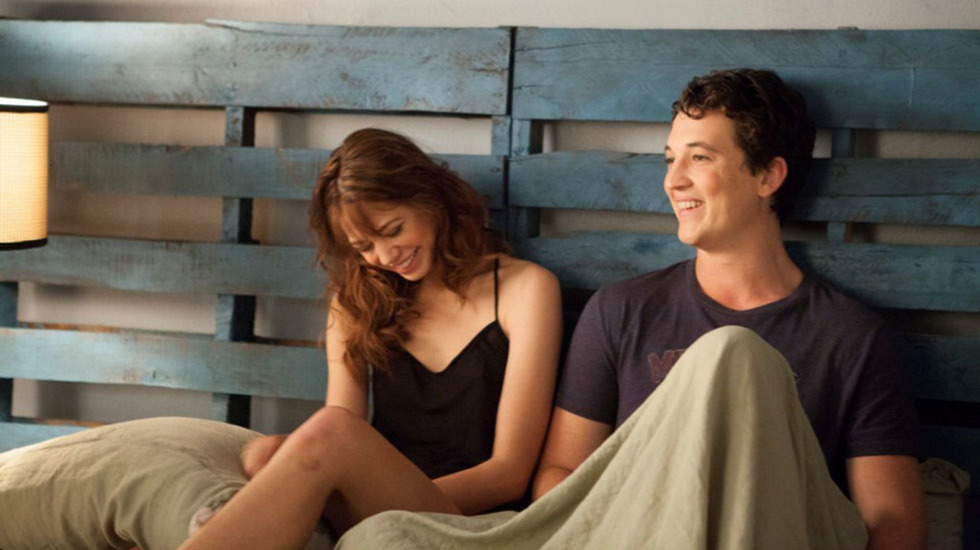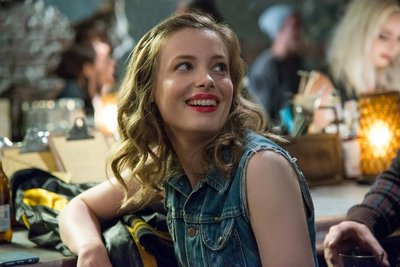
BY ZACHARY WIGON |
Max Nichols on Creating Chemistry for a 'Two Night Stand'
Max Nichols discusses his two-hander feature debut starring Miles Teller and Analeigh Tipton.

Working in a medley of different genres that includes - but is not limited to - John Hughes' 80s work and that special subset of films that feel, compellingly, like watching theater, Max Nichols has a lot of fun with his debut feature, Two Night Stand. The film takes place almost entirely in the apartment of Alec (Miles Teller), a young Brooklynite who's waking up after a one-night-stand with the attractive Megan (Analeigh Tipton), whom he's just met. Things get awkward and Megan leaves - except she can't exit the building: a horrible snowstorm has rendered the building's residents trapped inside for the time being. Forced to hang with Alec, the two characters find themselves slowly getting to know one another the day after their sexual encounter.
It's fitting that, in addition to the influences of seminal teen movies of Nichols' youth, the influence of a certain theatrical kind of filmmaking is apparent in the picture - Nichols, after all, is the progeny of theater-to-film master Mike Nichols, whose credits include, among other classics, Who's Afraid of Virginia Woolf? I had the chance to speak recently with Nichols about how his debut feature came together.
Tribeca Film: What was it about Two Night Stand that attracted you to the material?
MN: I really thought the script was smart and funny - I thought it had a lot of refreshing things to say about love and dating today. The dialogue was so honest and natural in a way I don't often find. But beyond all that, the story included what felt like some important, timely generational themes about the nature of courtship today, and what role ambition - as the previous generation defined it - should play in young peoples' lives today. It all reminded me of coming of age comedies of my youth, films that I adore, and I thought, oh man, this could be a really great opportunity to make an homage to the films that inspired me.
Tribeca Film: What are some of those films?
MN: I want to be clear, I wouldn't compare this to some of my favorite films, but I think everything I do will always be inspired by Fast Times at Ridgemont High, The Breakfast Club, because those films are influences on me as a person, not just a filmmaker.
If you can tap into that natural confusion that most people feel in their late teens or early 20s, you can create a story that resonates with a lot of people.
Tribeca Film: Like some of those John Hughes films, this film is about young people who are rather sophisticated, complex characters, something you don't find all that often.
MN: I'm so glad that came across for you. I think there are certain things that everyone has to figure out firsthand. How to be an evolved romantic, an evolved sexual partner, figuring out how to be considerate of others, it's something everyone has to figure out at some point. It's universal. If you can tap into that natural confusion that most people feel in their late teens or early 20s, you can create a story that resonates with a lot of people. You know, one thing that I remember growing up was, some of the films that I watched that took place in high school, they gave me an idea of what I had to look forward to, of what those years would be like. I remember feeling, as a young moviegoer, as if I was being granted entree into this next stage of life.
Tribeca Film: The manner in which this film portrays how courtship works is interesting. In this worldview, people hook up first and get to know one another only after they have sex.
MN: I think it seems like, to a greater degree than may have been the case in the past, the path to a relationship is hook up first and then see how compatible you are after. I don't know if the evidence is in yet whether that is a more or less effective path to long-term love. We have certainly seen, many times, how carnal incompatibility can be the undoing of an otherwise promising relationship. I'm not sure you need to start with one or the other. But the other thing that was compelling to me about the story was that neither Megan nor Alec are seasoned veterans of the online dating scene. When it comes down to engaging in that hook-up culture, they have to work to find that balance between who they're supposed to be and who they want to be, and that's something that everyone has to wrestle with.
Tribeca Film: One of my favorite scenes in the film is the scene where, after they sleep together, the next day, they rehash all the things the other did wrong. How did you put that scene together?
MN: There are many ways where we understand that there's a disconnect between something as an idea and the reality of it. I think that's true for Megan and Alec when they hook up - that this thing that's supposed to be easy and casual and fun winds up being more complicated for them. I think men and women often feel, when it comes to talking about sex or love, that it's easier if you can speak about things candidly. I think Alec, for example, wishes he could talk about sex with a girlfriend the way he can talk about it with his guy friends. Ultimately, however, I think Alec and Megan both walk away from that conversation understanding that there's a value in being delicate with other peoples' feelings.
Giving the actors the ability to take those conversations and live with them for a little while and come back with specific approaches, that's a really thrilling part of the process.
Tribeca Film: The film is basically a two-hander, the vast majority of it taking place in Alec's apartment. It feels a bit like a play at times, with the way the characters circle the space. Did you rehearse?
MN: We did have nice opportunities to rehearse. We went to the location and sat at the kitchen table and just read through the script together. That was a nice, intimate way to settle into the space, the characters. We didn't want to squeeze too much life out of the script in rehearsals, but we did a few scenes. That was really helpful for answering some questions before we started shooting. In terms of how we staged the shoot, we were really at the mercy of the schedules. But one of the first scenes we shot was the scene where Megan starts dancing and Alec watches her. The reason we shot that first was because I felt that if we created the right mood on set, if we established that mood of getting to know someone, staying up late, for the actors, that would carry through for the rest of the shoot, and it did.
Tribeca Film: You mentioned that, in rehearsals, you didn't want to squeeze the life out of the script. Filmmakers often talk about wanting to warm things up in rehearsal without taking things too far. How do you make sure you don't rehearse so much that the plane takes off early, so to speak?
MN: That's a good question. I think one of the useful things about rehearsal is that it's about reading - rehearsals are as much about reading as anything else. You always learn a bit about something just by hearing it out loud. Often it's practical things - you think, that line read well on the page but it has a problem when it's said out loud. That's an invaluable thing to learn a couple weeks out, as opposed to on the day. Being able to hear the words, or to figure out basic blocking, or to figure out what feels natural to the actors, that's all incredibly important. Also, I think a lot of the work a director does with actors is in the conversations you have together about the scenes - this is why this is here, this is what it means, this is why this happens. Giving the actors the ability to take those conversations and live with them for a little while and come back with specific approaches, that's a really thrilling part of the process.

